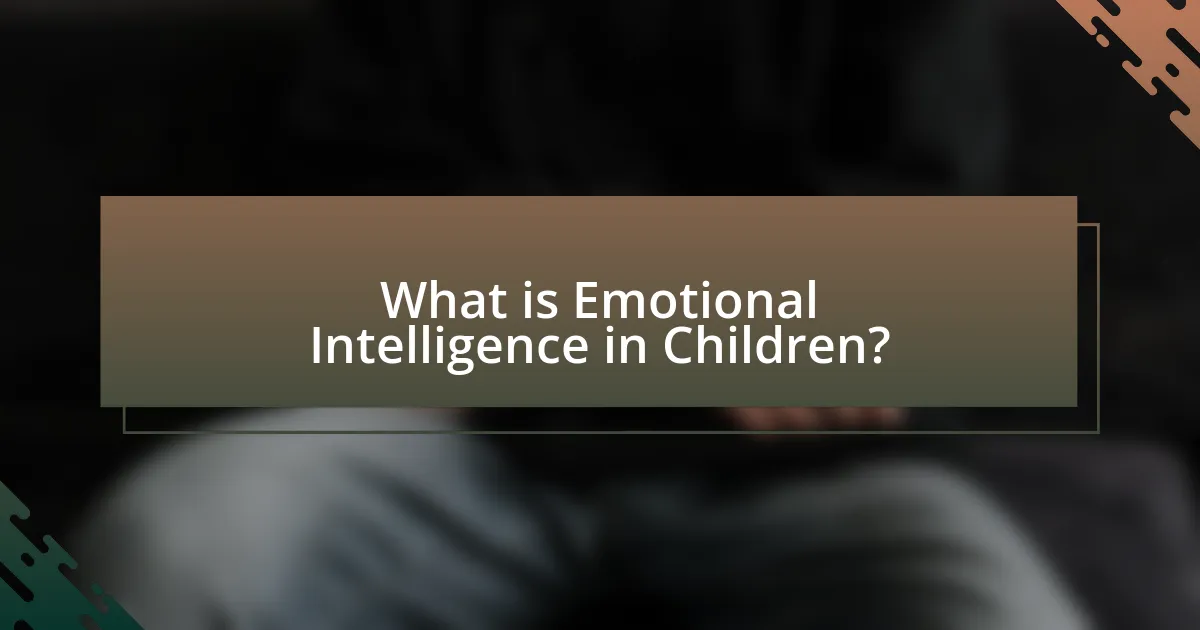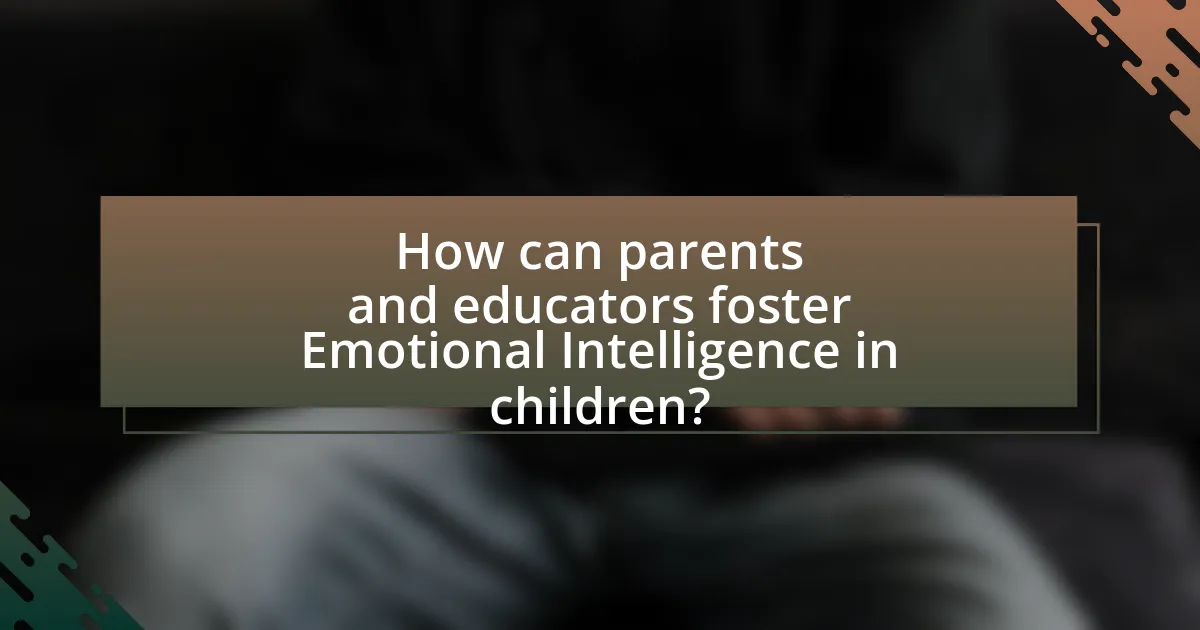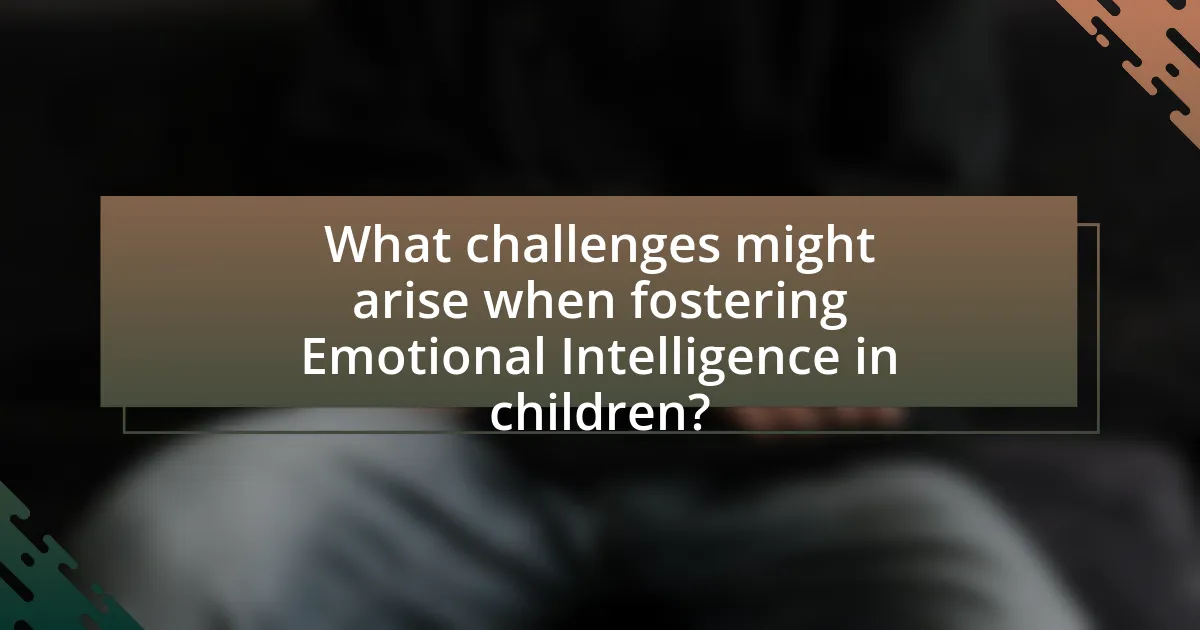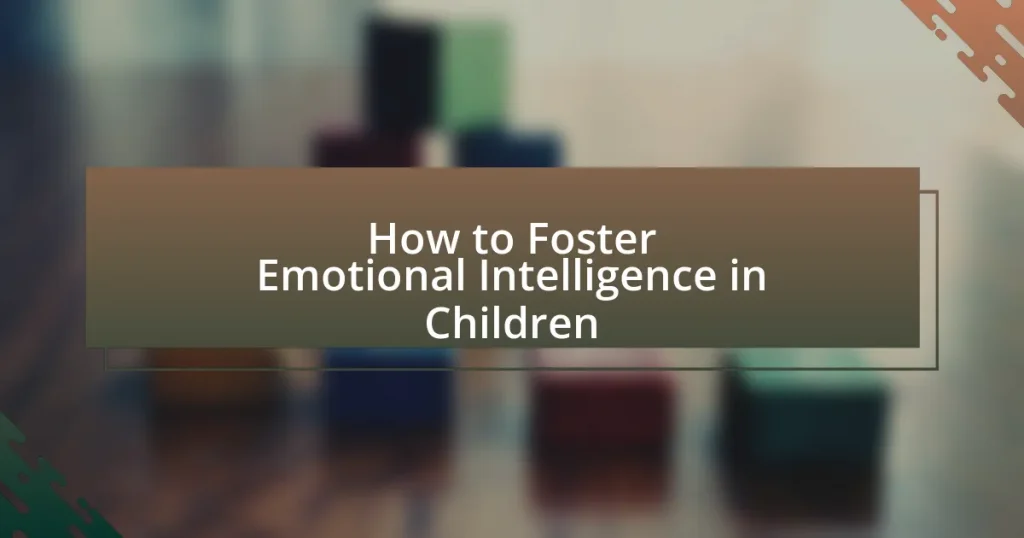Emotional intelligence in children encompasses the ability to recognize, understand, and manage their own emotions, as well as empathize with others. This article outlines the significance of emotional intelligence in childhood development, highlighting its key components such as self-awareness, self-regulation, social awareness, relationship management, and empathy. It discusses the differences between emotional intelligence and traditional intelligence, the benefits of fostering emotional intelligence for social interactions and academic performance, and practical strategies for parents and educators to enhance these skills. Additionally, it addresses challenges in promoting emotional intelligence and the role of community support in this developmental process.

What is Emotional Intelligence in Children?
Emotional intelligence in children refers to the ability to recognize, understand, and manage their own emotions, as well as the emotions of others. This skill set enables children to navigate social interactions effectively, empathize with peers, and handle conflicts constructively. Research indicates that children with high emotional intelligence tend to perform better academically and socially, as they can regulate their emotions and respond to challenges with resilience. Studies, such as those conducted by the Collaborative for Academic, Social, and Emotional Learning (CASEL), highlight the importance of emotional intelligence in fostering positive relationships and overall well-being in children.
How is Emotional Intelligence defined in the context of childhood?
Emotional Intelligence in the context of childhood is defined as the ability of children to recognize, understand, and manage their own emotions while also being able to empathize with the emotions of others. This definition encompasses skills such as emotional awareness, emotional regulation, and social skills, which are crucial for healthy interpersonal relationships and personal development. Research indicates that children with higher emotional intelligence tend to perform better academically and socially, as they can navigate social complexities and respond to emotional cues effectively. Studies, such as those conducted by Mayer, Salovey, and Caruso, have shown that emotional intelligence can be developed through targeted interventions, highlighting its importance in childhood development.
What are the key components of Emotional Intelligence in children?
The key components of Emotional Intelligence in children are self-awareness, self-regulation, social awareness, relationship management, and empathy. Self-awareness allows children to recognize their own emotions and understand how they affect their behavior. Self-regulation helps them manage their emotions and impulses, leading to better decision-making. Social awareness enables children to understand and empathize with the emotions of others, fostering positive interactions. Relationship management involves the ability to build and maintain healthy relationships through effective communication and conflict resolution. Empathy is crucial as it allows children to connect with others’ feelings, promoting kindness and compassion. Research indicates that these components contribute significantly to children’s social and academic success, as highlighted in studies by Goleman and others in the field of emotional intelligence.
How does Emotional Intelligence differ from traditional intelligence?
Emotional Intelligence (EI) differs from traditional intelligence (IQ) in that EI focuses on the ability to recognize, understand, and manage emotions in oneself and others, while traditional intelligence primarily measures cognitive abilities such as reasoning, problem-solving, and knowledge acquisition. Research by Daniel Goleman highlights that EI encompasses skills like empathy, emotional regulation, and interpersonal communication, which are crucial for social interactions and personal well-being, whereas traditional intelligence is often assessed through standardized tests that evaluate analytical and logical reasoning skills. This distinction underscores the importance of both types of intelligence in personal and professional success, as individuals with high EI tend to excel in collaborative environments and leadership roles.
Why is fostering Emotional Intelligence important for children?
Fostering Emotional Intelligence is important for children because it enhances their ability to understand and manage their emotions, leading to better social interactions and academic performance. Research indicates that children with high emotional intelligence are more likely to develop strong relationships, exhibit empathy, and handle stress effectively. A study published in the Journal of Educational Psychology found that students with higher emotional intelligence scores had better academic outcomes and were more engaged in school activities. This demonstrates that fostering emotional intelligence not only supports emotional well-being but also contributes to overall success in various aspects of life.
What benefits does Emotional Intelligence provide in social interactions?
Emotional Intelligence enhances social interactions by improving communication, empathy, and conflict resolution skills. Individuals with high Emotional Intelligence can better understand and manage their own emotions, which allows them to respond more effectively to others’ feelings. Research indicates that people with strong Emotional Intelligence are more adept at forming and maintaining relationships, as they can navigate social complexities with greater ease. For instance, a study published in the Journal of Personality and Social Psychology found that individuals with higher Emotional Intelligence are more likely to engage in prosocial behaviors, fostering positive social connections.
How does Emotional Intelligence impact academic performance?
Emotional Intelligence significantly enhances academic performance by improving students’ ability to manage emotions, establish positive relationships, and navigate social complexities. Research indicates that students with high emotional intelligence tend to exhibit better academic outcomes, as they are more adept at coping with stress, engaging in collaborative learning, and maintaining motivation. A study published in the Journal of Educational Psychology found that emotional intelligence is positively correlated with academic achievement, suggesting that students who can effectively regulate their emotions and empathize with others are more likely to succeed in their studies.

How can parents and educators foster Emotional Intelligence in children?
Parents and educators can foster Emotional Intelligence in children by teaching them to recognize and manage their emotions, as well as to empathize with others. This can be achieved through modeling emotional awareness, encouraging open discussions about feelings, and providing opportunities for social interactions that require cooperation and understanding. Research indicates that children who engage in social-emotional learning programs show improved emotional regulation and interpersonal skills, which are critical components of Emotional Intelligence. For instance, a study published in the journal “Child Development” found that students who participated in such programs demonstrated significant gains in emotional and social skills compared to those who did not.
What strategies can be implemented at home to enhance Emotional Intelligence?
To enhance Emotional Intelligence at home, parents can implement strategies such as modeling emotional awareness, encouraging open communication about feelings, and teaching empathy through role-playing. Modeling emotional awareness involves parents expressing their own emotions and discussing them openly, which helps children recognize and understand their feelings. Encouraging open communication allows children to articulate their emotions, fostering a safe environment for emotional expression. Teaching empathy through role-playing scenarios enables children to practice understanding others’ perspectives, which is crucial for developing emotional intelligence. Research indicates that children who engage in these practices show improved emotional regulation and social skills, supporting the effectiveness of these strategies.
How can parents model emotional awareness and regulation?
Parents can model emotional awareness and regulation by openly expressing their own emotions and discussing them with their children. This practice helps children recognize and understand their feelings, as research indicates that children learn emotional skills through observation and interaction with their parents. For instance, when a parent articulates their feelings during a stressful situation, such as saying, “I feel frustrated because I can’t find my keys,” it provides a concrete example of emotional expression and regulation. Additionally, parents can demonstrate coping strategies, such as deep breathing or taking a break, which reinforces healthy emotional management. Studies show that children who observe effective emotional regulation in their parents are more likely to develop similar skills, leading to improved emotional intelligence.
What activities can promote empathy and social skills in children?
Engaging in role-playing activities can promote empathy and social skills in children. Role-playing allows children to step into different characters’ shoes, fostering an understanding of diverse perspectives and emotions. Research indicates that children who participate in role-playing games demonstrate improved social interactions and emotional awareness, as they learn to navigate various social scenarios and respond to others’ feelings effectively. Additionally, cooperative games that require teamwork and communication further enhance social skills by encouraging collaboration and problem-solving among peers.
What role do schools play in developing Emotional Intelligence?
Schools play a crucial role in developing Emotional Intelligence by providing structured environments where students can learn to recognize, understand, and manage their emotions as well as those of others. Through social-emotional learning (SEL) programs, schools teach skills such as empathy, self-regulation, and interpersonal communication, which are essential components of Emotional Intelligence. Research indicates that students who participate in SEL programs show improved emotional skills, better academic performance, and enhanced social interactions. For example, a meta-analysis by Durlak et al. (2011) found that SEL programs significantly improved students’ social and emotional skills, attitudes, and academic performance, demonstrating the effectiveness of school-based initiatives in fostering Emotional Intelligence.
How can teachers incorporate Emotional Intelligence into their curriculum?
Teachers can incorporate Emotional Intelligence into their curriculum by integrating social-emotional learning (SEL) programs that focus on self-awareness, self-regulation, social awareness, relationship skills, and responsible decision-making. Research indicates that SEL programs can lead to improved academic performance and better emotional regulation among students. For example, a meta-analysis by Durlak et al. (2011) found that students participating in SEL programs showed an 11-percentile-point gain in academic achievement compared to those who did not participate. Additionally, teachers can use role-playing activities, discussions about emotions, and reflective journaling to help students practice and understand emotional concepts in real-life contexts.
What programs or resources are available to support Emotional Intelligence in schools?
Programs and resources available to support Emotional Intelligence in schools include the Collaborative for Academic, Social, and Emotional Learning (CASEL), which provides a framework for integrating social and emotional learning (SEL) into school curricula. Additionally, programs like Second Step and PATHS (Promoting Alternative Thinking Strategies) offer structured lessons that enhance students’ emotional skills. Research indicates that schools implementing SEL programs see improvements in student behavior, academic performance, and mental health, as evidenced by a meta-analysis published in the journal “Child Development,” which found that SEL interventions significantly boost students’ social-emotional skills and academic achievement.

What challenges might arise when fostering Emotional Intelligence in children?
Fostering Emotional Intelligence in children can face several challenges, including a lack of parental understanding and inconsistent modeling of emotional behaviors. Parents and caregivers may not fully grasp the concept of Emotional Intelligence, leading to inadequate support in developing these skills. Research indicates that children learn emotional skills primarily through observation; thus, if adults do not demonstrate emotional awareness and regulation, children may struggle to acquire these competencies themselves. Additionally, societal pressures and cultural norms can hinder open discussions about emotions, making it difficult for children to express and manage their feelings effectively. These challenges highlight the importance of education and support for both parents and children in the emotional development process.
What common obstacles do parents face in promoting Emotional Intelligence?
Parents commonly face obstacles such as lack of awareness, time constraints, and emotional regulation challenges when promoting Emotional Intelligence in their children. Lack of awareness can stem from insufficient knowledge about Emotional Intelligence and its importance, which limits parents’ ability to teach these skills effectively. Time constraints often arise from busy schedules, making it difficult for parents to engage in meaningful emotional discussions or activities with their children. Additionally, parents may struggle with their own emotional regulation, which can hinder their ability to model appropriate emotional responses and behaviors. Research indicates that parents who are emotionally aware and engaged are more likely to foster similar skills in their children, highlighting the significance of overcoming these obstacles.
How can cultural differences affect the understanding of Emotional Intelligence?
Cultural differences significantly affect the understanding of Emotional Intelligence by shaping how emotions are expressed, interpreted, and valued across various societies. For instance, in collectivist cultures, emotional expression may be more subdued to maintain group harmony, while individualistic cultures often encourage open emotional expression. Research by Matsumoto et al. (2008) highlights that cultural norms dictate emotional display rules, influencing how individuals perceive and respond to emotional cues. This variation in emotional expression and interpretation can lead to misunderstandings in cross-cultural interactions, impacting the development and application of Emotional Intelligence in children.
What misconceptions about Emotional Intelligence should be addressed?
One major misconception about Emotional Intelligence (EI) is that it is solely about being nice or having good social skills. This oversimplification ignores the complexity of EI, which encompasses self-awareness, self-regulation, motivation, empathy, and social skills. Research by Mayer, Salovey, and Caruso (2004) highlights that EI involves the ability to recognize, understand, and manage emotions in oneself and others, which is crucial for effective interpersonal interactions and decision-making. Another misconception is that EI is fixed and cannot be developed; however, studies indicate that emotional intelligence can be cultivated through targeted training and practice, as shown in a meta-analysis by Schutte et al. (2007). Addressing these misconceptions is essential for fostering a more accurate understanding of EI, particularly in the context of developing emotional skills in children.
How can parents overcome these challenges effectively?
Parents can effectively overcome challenges in fostering emotional intelligence in children by implementing consistent communication strategies and modeling emotional awareness. Establishing open dialogues about feelings encourages children to express themselves and understand their emotions better. Research indicates that children who engage in discussions about emotions with their parents develop higher emotional intelligence, as evidenced by a study published in the Journal of Child Psychology and Psychiatry, which found that parental involvement in emotional conversations significantly correlates with children’s emotional regulation skills. Additionally, parents should demonstrate empathy and emotional responses in their own behavior, as children learn through observation. This approach not only addresses the challenges but also creates a supportive environment conducive to emotional growth.
What resources are available for parents seeking guidance on Emotional Intelligence?
Parents seeking guidance on Emotional Intelligence can access a variety of resources including books, online courses, and workshops. Notable books such as “Emotional Intelligence 2.0” by Travis Bradberry and Jean Greaves provide practical strategies for developing emotional skills. Online platforms like Coursera and Udemy offer courses specifically designed for parents to enhance their understanding of Emotional Intelligence. Additionally, organizations like the Collaborative for Academic, Social, and Emotional Learning (CASEL) provide research-based resources and tools to help parents foster these skills in their children. These resources are validated by educational research emphasizing the importance of Emotional Intelligence in child development.
How can community support enhance efforts to foster Emotional Intelligence?
Community support enhances efforts to foster Emotional Intelligence by providing a collaborative environment where individuals can practice and develop emotional skills. When communities engage in activities such as workshops, mentorship programs, and group discussions, they create opportunities for children to learn empathy, self-regulation, and social awareness through real-life interactions. Research shows that children who participate in community-based programs exhibit improved emotional understanding and interpersonal skills, as these settings encourage open communication and emotional expression. For instance, a study published in the Journal of Community Psychology found that children involved in community service projects demonstrated higher levels of empathy and emotional regulation compared to their peers who did not participate. This evidence underscores the significant role that community support plays in nurturing Emotional Intelligence among children.
What practical tips can help in fostering Emotional Intelligence in children?
To foster Emotional Intelligence in children, parents and educators can implement several practical strategies. Encouraging open communication about feelings helps children identify and express their emotions effectively. Engaging in role-playing activities allows children to practice empathy by stepping into others’ shoes, enhancing their understanding of different perspectives. Teaching problem-solving skills equips children to navigate social conflicts and emotional challenges, fostering resilience. Additionally, modeling emotional regulation by demonstrating healthy coping strategies in stressful situations provides children with concrete examples to emulate. Research indicates that children who develop these skills show improved social interactions and academic performance, highlighting the importance of fostering Emotional Intelligence early in life.
How can daily routines be structured to promote emotional learning?
Daily routines can be structured to promote emotional learning by incorporating specific activities that encourage emotional awareness and expression. For instance, integrating daily check-ins where children share their feelings fosters emotional vocabulary and recognition. Research indicates that routines involving reflection, such as journaling or discussing daily experiences, enhance emotional intelligence by allowing children to process their emotions and understand others’ perspectives. Additionally, including collaborative activities, like group problem-solving tasks, can teach empathy and social skills, which are crucial components of emotional learning.
What role does open communication play in developing Emotional Intelligence?
Open communication is essential for developing Emotional Intelligence as it fosters understanding and expression of emotions. When individuals engage in open dialogue, they learn to articulate their feelings and recognize the emotions of others, which enhances empathy and self-awareness. Research indicates that children who experience open communication with caregivers are more likely to develop strong emotional skills, as they feel safe to express themselves and explore their emotions. For instance, a study published in the Journal of Child Psychology and Psychiatry found that children with supportive communication environments showed higher levels of emotional regulation and social competence. This evidence underscores the critical role that open communication plays in nurturing Emotional Intelligence.
